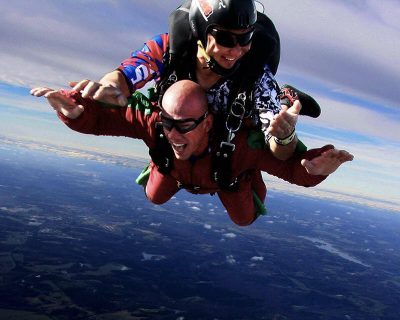Willingly throwing yourself out of a “perfectly good airplane” may seem like one of the most illogical things to do. Why do so many people constantly do it? Why is it one of the most popular bucket-list items to check off? Because by and large skydiving’s side effects are positive. Here’s the skinny on the top effects of skydiving.
After-Effects of Skydiving on The Brain
 When we do something enjoyable that excites us; dopamine, serotonin, adrenaline, and endorphins are released in our brains. Dopamine determines how extensively we’ll feel something, and serotonin generates those warm fuzzies that we feel when we’re truly happy and anxiety-free. Endorphins help us produce that feel-good, comforting emotion. Mix them all together and you have something that is both rare and unmatched.
When we do something enjoyable that excites us; dopamine, serotonin, adrenaline, and endorphins are released in our brains. Dopamine determines how extensively we’ll feel something, and serotonin generates those warm fuzzies that we feel when we’re truly happy and anxiety-free. Endorphins help us produce that feel-good, comforting emotion. Mix them all together and you have something that is both rare and unmatched.
A change of perspective is the most commonly reported after effect of skydiving. Whether you do one jump or hundreds, there is nothing like being under the canopy and realizing that you are (literally) above all of your problems on the ground. People often have a different outlook on the world and the troubles in their lives hold less weight after jumping. The emotions that result from jumping are combined with the overall sense of community created by fellow jumpers, parachute packers, manifest workers, pilots, and ground crew.
Discovering the benefits of skydiving with the friends-turned-family at the dropzone is one of the greatest effects of joining the sport. Skydivers relate to each other on a level that other people in our lives do not, and it is evident that we are not thrill-seekers, we’re happiness-seekers.
After Effects of Skydiving on The Body
 The most common of the physical side effects of skydiving is soreness – but, it is expected and can be prepared for on the ground by stretching beforehand. Those who jump regularly notice an increase in flexibility and endurance. This is because, over time, you’ll become accustomed to carrying 20-25 lbs of gear on your back, which doesn’t feel natural at first! You’ll become more in-tune with your body, and how your brain and body work together, in an exciting environment.
The most common of the physical side effects of skydiving is soreness – but, it is expected and can be prepared for on the ground by stretching beforehand. Those who jump regularly notice an increase in flexibility and endurance. This is because, over time, you’ll become accustomed to carrying 20-25 lbs of gear on your back, which doesn’t feel natural at first! You’ll become more in-tune with your body, and how your brain and body work together, in an exciting environment.
Increased muscle mass and muscle tone will also come about from the addition of carrying your gear during your weekend (or daily, if you’re lucky!) skydiving routine. The glutes, back, core, and nearly all upper body muscles are affected during a jump. From counteracting the momentum of the wind in free-fall to steering and flaring your canopy, our bodies experience new and healthy stressors.
Are All Side Effects of Skydiving Positive?
There are very few negative physiological effects of skydiving in comparison to the positive ones. There are some skydiving health risks – as mentioned, the most frequent being a bit of soreness. After all, it’s not every day you’re wearing a harness, strapped to a professional, and hurtling through the air at 120+ mph! Sometimes pressure changes can result in ears that pop similar to that you’ll have on any commercial flight and is easily fixed.
Occasionally, the way skydiving feels may relate to motion sickness, but telling your instructor beforehand (or flying the canopy yourself) can eliminate this and result in a fun time for everyone. These unfavorable side effects can usually be prevented by eating normally and staying hydrated on the day of your jump.
Are the Skydiving After-Effects Worth It?
YES. Skydiving allows YOU to reconstruct fear and vulnerability into empowerment. Stepping out of the plane may seem like a relatively simple task…well, maybe not, but the point still stands: using your own willpower to conquer fears and defy expectations that either you’ve set for yourself or that have been set for you is a momentous feeling. And skydiving is a sport that allows you to experience this feeling over and over (and over …) again with a community that cares about and supports you.
Still curious what the biggest after-effect of skydiving is? Complete and utter euphoria. Ready to join our tribe? Come and jump with Skydive Monroe!
Copyright © 2025, Skydive Monroe, All Rights Reserved.
DropZone Web Design & Marketing by Beyond Marketing, LLC



